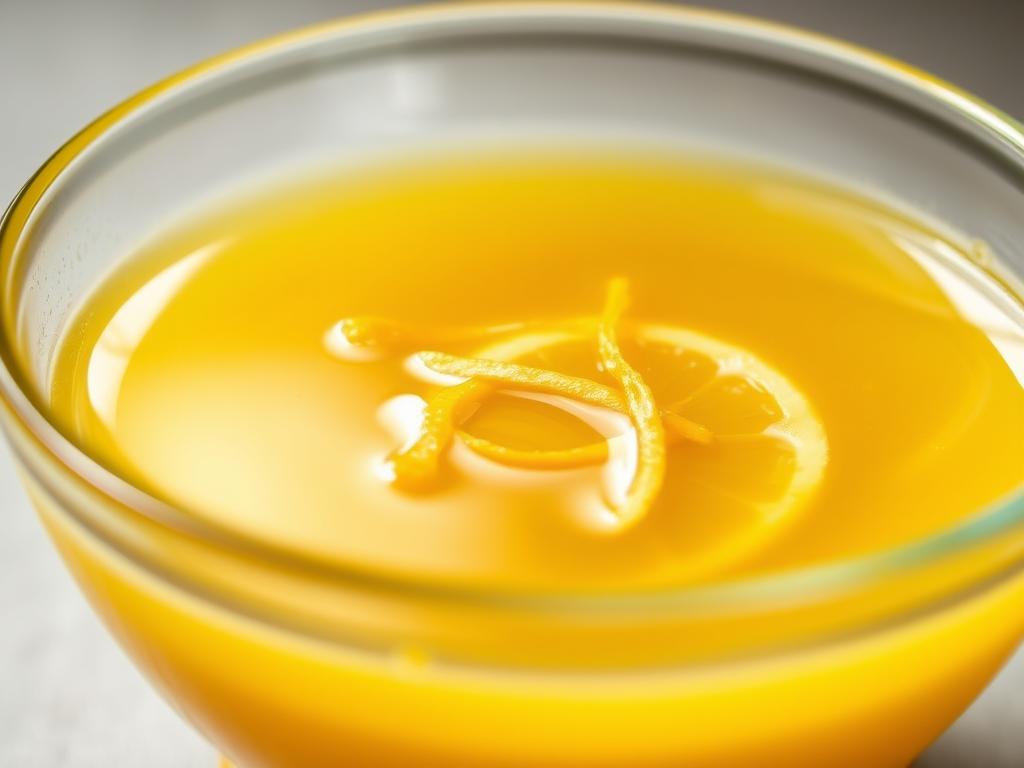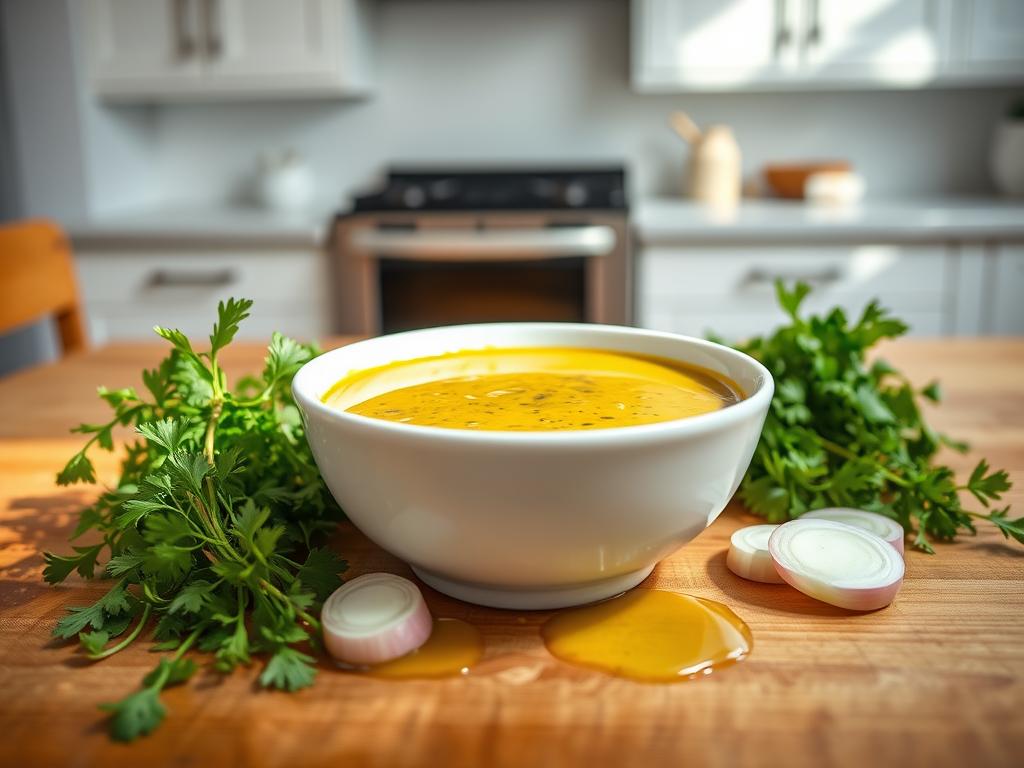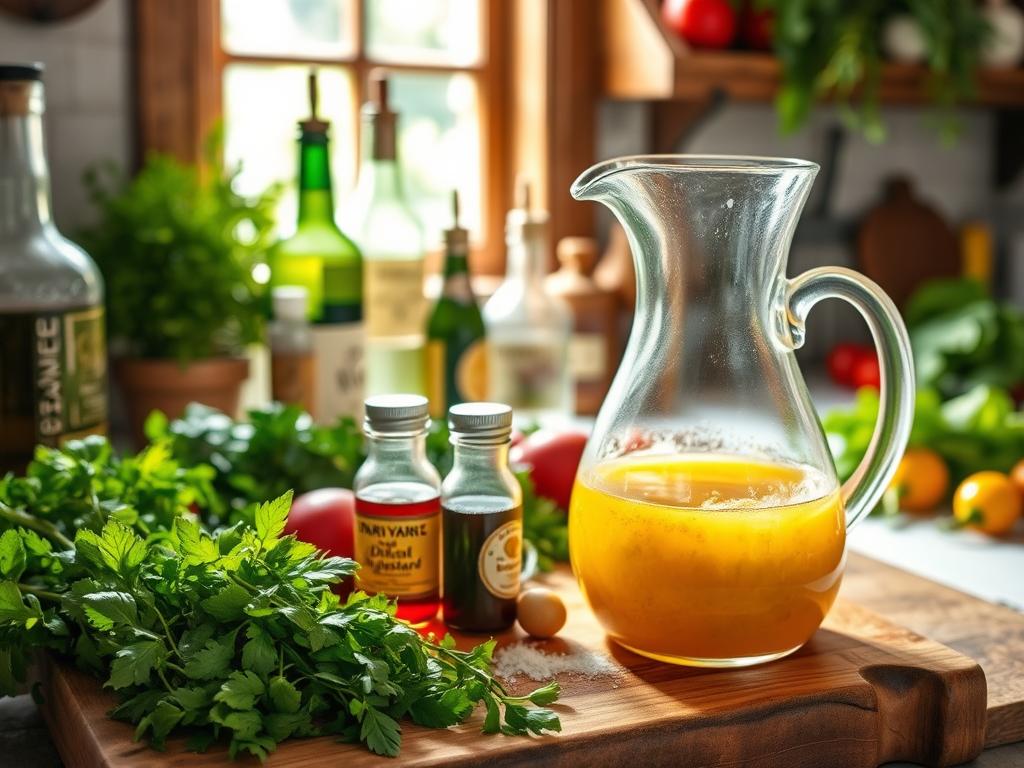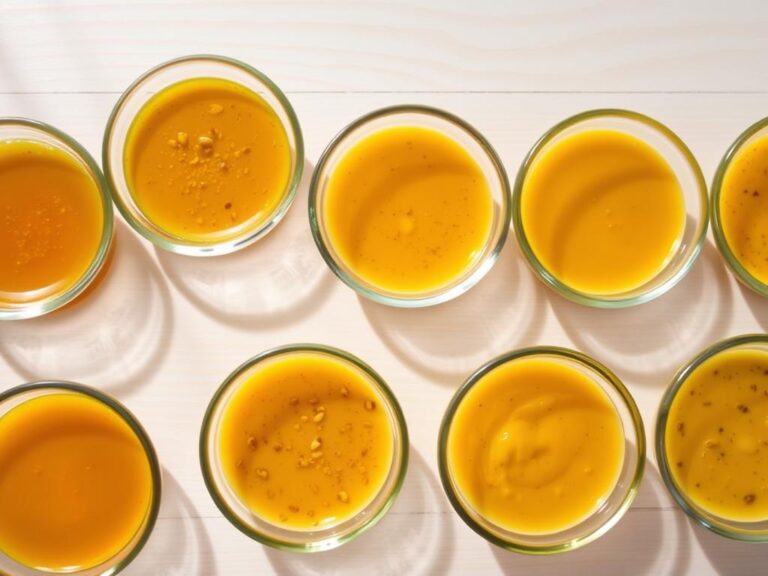8 French-Style Vinaigrette Ideas
This post may contain affiliate links which means I may receive a commission for purchases made through links at no extra cost to you. I only recommend products I truly believe in. Thank you for your support!
Take your cooking to the next level with these tasty homemade vinaigrette recipes. They bring the classic French dressing to life. These 8 French-Style Vinaigrette Ideas will make your salads truly special.
French vinaigrettes are all about simplicity. They mix tangy vinegar, rich olive oil, and zesty Dijon mustard. Each recipe offers a unique twist on the traditional 3:1 oil to vinegar ratio. This ensures a gourmet experience for your taste buds.
Our collection includes both traditional and innovative recipes. Whether you’re a home cook looking to impress or a culinary enthusiast, these vinaigrettes will elevate your dishes. They add sophistication to every meal.
Get ready to discover the secrets of authentic French dressings. These recipes are easy to make and incredibly delicious. Prepare to enhance your meals with these vibrant, versatile vinaigrettes. They celebrate the art of simple, elegant cooking.
What is French-Style Vinaigrette?
Exploring classic French dressing shows us a mix of simplicity and elegance. It’s more than just a salad topping. It’s a blend of flavors that makes any dish special.
The secret to this dressing is its perfect mix of ingredients and technique. It turns simple salads into gourmet dishes through its balanced flavors.
The Tradition Behind the Recipe
French vinaigrette comes from a long line of culinary traditions. It values fresh, quality ingredients and precise preparation. The goal is to make an emulsion – a smooth mix of oil and vinegar.
- Originated in classic French cuisine
- Emphasizes fresh, quality ingredients
- Requires precise mixing technique
Key Ingredients You Need
To make easy vinaigrette variations, you need to know the basic ingredients. A classic French dressing includes:
| Ingredient | Quantity | Purpose |
|---|---|---|
| Extra Virgin Olive Oil | 3/4 cup | Rich base providing smooth texture |
| Red Wine Vinegar | 1/4 cup | Adds tangy flavor |
| Dijon Mustard | 1-2 teaspoons | Emulsifier and flavor enhancer |
| Kosher Salt | 1 teaspoon | Balances and intensifies flavors |
| Black Pepper | 1/4 teaspoon | Adds subtle heat |
The key ratio for a great vinaigrette is 3:1 – three parts oil to one part acid. This makes a balanced dressing that sticks well to greens.
Pro tip: Use top-notch olive oil and fresh ingredients for the best French vinaigrette.
Classic French Vinaigrette Recipe
Making homemade vinaigrette is simpler than you think. The classic French vinaigrette is a key to making any salad special. It turns a simple salad into a feast for the taste buds.
Now, let’s explore the authentic French dressing recipe. It’s a blend of simplicity and flavor. This vinaigrette needs just a few ingredients but packs a big punch.
Simple Preparation Steps
- Gather your ingredients: extra virgin olive oil, red wine vinegar, Dijon mustard, salt, and pepper
- Whisk Dijon mustard with vinegar in a bowl
- Add salt and freshly ground black pepper
- Slowly drizzle olive oil while continuously whisking
- Taste and adjust seasoning as needed
Flavor Enhancement Tips
To make your vinaigrette even better, try these tips:
- Mince fresh shallots for added depth
- Incorporate fresh herbs like tarragon or basil
- Experiment with different vinegar types
| Ingredient | Quantity | Purpose |
|---|---|---|
| Extra Virgin Olive Oil | ½ cup | Base and richness |
| Red Wine Vinegar | ¼ cup | Acidity and tang |
| Dijon Mustard | 4 teaspoons | Emulsification and flavor |
| Shallots | ¼ cup, chopped | Aromatic depth |
Your salad dressing will last up to 8-10 days in the fridge. Remember, always shake or whisk before using to mix the ingredients well!
Herb-Infused Vinaigrette Variations
Make your salad dressings special with herbs! Easy vinaigrette variations can turn a simple dressing into a gourmet treat. Fresh and dried herbs add unique tastes and smells that change your vinaigrette’s flavor.
Fresh vs. Dried Herbs: A Flavorful Exploration
When making gourmet vinaigrette blends, knowing the difference between fresh and dried herbs is key. Fresh herbs give:
- Bright, vibrant flavors
- Delicate texture
- Best for summer salads
Dried herbs offer:
- More concentrated flavor
- Longer shelf life
- Perfect for winter dishes
Popular Herb Combinations to Explore
Find tasty herb pairings to boost your vinaigrettes:
- Provençal Blend: Thyme, basil, and oregano
- Delicate Mix: Chervil and tarragon
- Classic French: Parsley, chives, and tarragon
Pro tip: Use about one-third the amount of dried herbs as fresh herbs to avoid overpowering the dressing.
Remember, the secret to amazing easy vinaigrette variations is to experiment. Don’t hesitate to mix and match herbs to find your favorite gourmet vinaigrette blends!
Citrus-Infused Vinaigrettes

Take your salads to the next level with tangy vinaigrettes. These dressings add bright, zesty flavors. They turn simple greens into a feast for your taste buds.
Citrus juices make vinaigrettes special. They add depth and complexity to your dishes. Their natural acidity cuts through richness, bringing freshness to the table.
Lemon-Garlic Vinaigrette Recipe
Make a dressing that will make your taste buds dance with these ingredients:
- ¼ cup fresh lemon juice
- ¼ to ⅓ cup extra-virgin olive oil
- 1 minced garlic clove
- ½ teaspoon honey (optional)
- Salt and pepper to taste
Here’s how to whisk it:
- Start with lemon juice and garlic
- Slowly add olive oil while whisking
- Add honey for sweetness
- Season with salt and pepper
Orange-Basil Vinaigrette Recipe
For a sweeter twist, try this citrusy vinaigrette:
- ¼ cup fresh orange juice
- ¼ cup extra-virgin olive oil
- 2 tablespoons chopped fresh basil
- 1 teaspoon Dijon mustard
- Salt and pepper to taste
Each recipe makes about ½ cup of dressing. Store it in a sealed container in the fridge for up to a week. Before using, let it sit at room temperature for 30 minutes to get smooth again.
Pro tip: Change the oil-to-acid ratio to your liking. A 3:1 ratio is classic, while a 3:2 ratio is more vibrant and less oily.
Sweet and Savory Combinations
Explore the world of sweet and savory flavors to elevate your vinaigrettes. These techniques can turn a simple salad into a gourmet delight.
Creating a tasty vinaigrette is all about finding the right mix of sweet and sour. Let’s look at some ways to add new flavors to your dressings.
Adding Honey for Depth
Honey adds a deep, rich flavor to your vinaigrette. Here’s how to use it:
- Start with 1 teaspoon of raw honey per 1/4 cup of dressing
- Whisk well to mix it in fully
- Try it with bitter greens like arugula for a great taste contrast
Incorporating Fruit Purees
Fruit purees can change your vinaigrettes by adding color and new tastes.
| Fruit Puree | Flavor Profile | Best Paired With |
|---|---|---|
| Raspberry | Tangy and Sweet | Mixed Green Salads |
| Peach | Smooth and Mellow | Spinach Salads |
| Apricot | Delicate and Bright | Arugula Salads |
When making these dressings, balance sweet with a bit of acid. A little white balsamic vinegar keeps the flavors in check.
- Use only the freshest ingredients
- Try out different fruit and herb mixes
- Adjust the vinegar to keep the taste balanced
Mustard-Based Vinaigrette Ideas

Mustard turns classic French dressing into a work of art. It adds depth and makes vinaigrettes smooth and creamy. These changes will make your salads and appetizers taste amazing.
French cooking loves mustard in dressings. These ideas will spark your creativity and bring French flavors to your meals.
Classic Dijon Vinaigrette
Dijon mustard makes your French dressing tangy and rich. Here’s a simple recipe to make this essential vinaigrette:
- 2 tablespoons Dijon mustard
- 1/4 cup red wine vinegar
- 1/2 cup extra-virgin olive oil
- Salt and freshly ground black pepper
Whole Grain Mustard Variation
Whole grain mustard adds texture and rustic charm. It gives your vinaigrette a bold flavor.
| Ingredient | Quantity | Purpose |
|---|---|---|
| Whole Grain Mustard | 2 tablespoons | Base flavor |
| Apple Cider Vinegar | 3 tablespoons | Acidity |
| Canola Oil | 1/2 cup | Emulsification |
Pro tip: Whisk ingredients vigorously to create a smooth, well-integrated dressing that complements hearty salads and roasted vegetables.
Creamy French Vinaigrette Options
Make your homemade vinaigrette recipes fancy with a creamy twist. This turns simple salads into gourmet dishes. Creamy French vinaigrettes have a smooth, velvety feel that’s different from usual recipes.
Crafting the Perfect Creamy Base
To make a creamy vinaigrette, you need special ingredients. They add a silky, rich feel to your dressing. The trick is to pick the right mixers that make it smooth.
- Egg yolk for a mayonnaise-like consistency
- Greek yogurt for a tangy profile
- Crème fraîche for luxurious smoothness
- Ripe avocado for a vegan alternative
Emulsion Mastery: Tips for Perfect Blending
Getting a creamy vinaigrette right is all about how you mix it. Begin by whisking your creamy part with vinegar and spices. Then, add oil slowly while whisking non-stop.
| Ingredient | Quantity | Purpose |
|---|---|---|
| Extra Virgin Olive Oil | 1/4 cup | Base liquid |
| Vinegar | 1/4 cup | Acidic component |
| Mayonnaise/Greek Yogurt | 2 tablespoons | Creamy emulsifier |
| Dijon Mustard | 2 tablespoons | Additional emulsifier |
Pro tip: Always use pasteurized eggs when adding egg yolks for safety. Keep your creamy vinaigrette in the fridge and use it within 4 weeks for the best taste.
These fancy vinaigrette blends are great for more than just salads. Try them as dips, sandwich spreads, or over roasted veggies for extra taste.
Seasonal Vinaigrette Inspirations
Creating easy vinaigrette variations for each season can make your salads exciting. Using seasonal produce, you can make dressings that show off spring and autumn’s unique tastes.
Spring Vegetable Vinaigrette
Spring brings vibrant colors and fresh tastes. A light, zesty vinaigrette celebrates these. Here are some key ingredients for a spring dressing:
- Finely minced spring onions
- Fresh chives
- Lemon zest
- Blanched and pureed green peas
These ingredients make a green-hued dressing that’s as fresh as spring gardens. The mix of herbs and citrus adds a light, refreshing taste to your salads.
Autumn Root Vegetable Vinaigrette
Autumn brings rich, earthy tones. A vinaigrette can reflect this with roasted root vegetables:
- Roasted beets
- Caramelized carrots
- Warm spices like cinnamon
- A touch of maple syrup
This dressing is deeply colored and subtly sweet. It’s perfect with fall greens and roasted nuts. Making vinaigrettes for each season keeps your salads exciting all year.
| Season | Key Ingredients | Flavor Profile |
|---|---|---|
| Spring | Green peas, chives, lemon | Bright, Fresh |
| Autumn | Roasted beets, carrots, maple | Rich, Earthy |
Homemade vinaigrettes are all about trying new things. Experiment with local, seasonal ingredients to make your own unique salad dressing.
Storage Tips for Vinaigrettes
Making homemade vinaigrette recipes is not just about skill. It also needs smart storage tips. Your tasty vinaigrette recipes should be stored right to keep their flavors fresh.
Refrigeration and Shelf Life
Knowing how long to store homemade vinaigrettes is key. Most can be kept in the fridge with some rules:
- Herb-based vinaigrettes: 3-4 days
- Vinaigrettes with fresh garlic: 3 days
- Dairy or citrus-containing vinaigrettes: 2-3 days
- Standard oil and vinegar mixtures: Up to 1 week
Best Storage Containers
| Container Type | Capacity | Best For |
|---|---|---|
| Mason Jar | 16 oz | Large batch vinaigrettes |
| Glass Bottle with Lid | 10 oz | Single serving vinaigrettes |
| Dressing Shaker | 13 oz | Convenient mixing and storage |
Storage Pro Tips
To keep your vinaigrettes fresh, always:
- Use clean, airtight glass containers
- Shake well before each use
- Store in the coldest part of your refrigerator
- Check for any separation or off-odors before using
By following these tips, you’ll keep your homemade vinaigrette recipes fresh. This way, every serving will be full of flavor.
Pairing Vinaigrette with Salads
Making the perfect salad is an art. It starts with picking the right dressing. A tasty salad dressing can turn simple greens into a masterpiece.
A great vinaigrette can make any salad better. It can highlight the salad’s flavors. Let’s look at some tasty pairings that will excite your taste buds!
Light and Refreshing Combinations
For light, crisp salads, pick vinaigrettes that add without too much. Here are some great matches:
- Butter lettuce with a light lemon vinaigrette
- Mixed greens with herb-infused dressing
- Cucumber salad with a gentle white wine vinaigrette
Bold Flavors for Hearty Salads
For strong salads, you need bold dressings. Try these powerful pairings:
- Kale salad with a robust Dijon vinaigrette
- Roasted vegetable salad with garlic-anchovy dressing
- Spinach salad with a warm bacon vinaigrette
Remember, balance is key. The right vinaigrette can make a simple salad unforgettable. Feel free to try new things and find your favorite flavors!
Vinaigrette Beyond Salads
Gourmet vinaigrette blends are more than just salad dressings. They are versatile tools in the kitchen. Both professional chefs and home cooks use them to enhance many dishes, not just salads.
Marinades are a great use for French-style vinaigrettes. They make chicken, fish, and veggies taste amazing. The vinegar tenderizes the food, making it juicy and full of flavor.
Exploring Marinades and Sauces
Try making your own vinaigrettes for marinades. They can turn simple proteins into gourmet meals. Use white wine vinegar or lemon juice as a base. Add fresh herbs like thyme or parsley for a burst of flavor.
Drizzling on Roasted Vegetables
Roasted veggies get even better with a good vinaigrette. Drizzle it over warm, caramelized veggies for a bright, rich taste. Carrots and parsnips love the tangy kick of a well-made vinaigrette.






